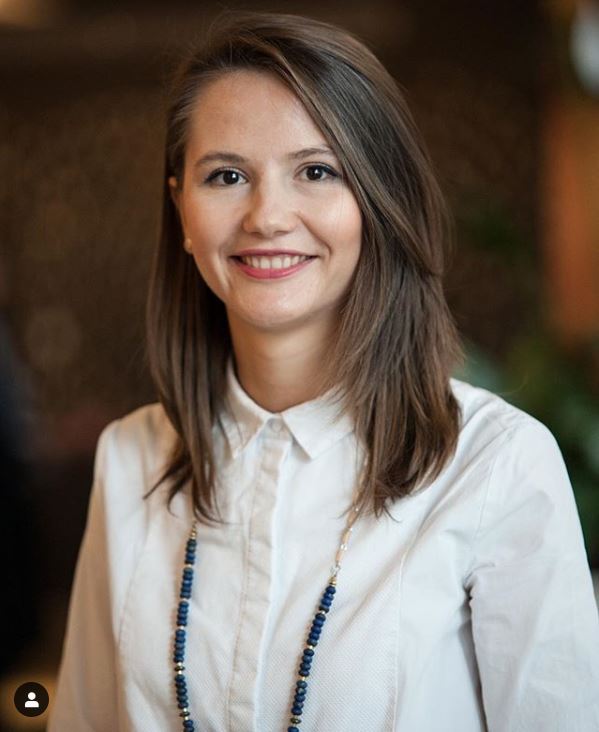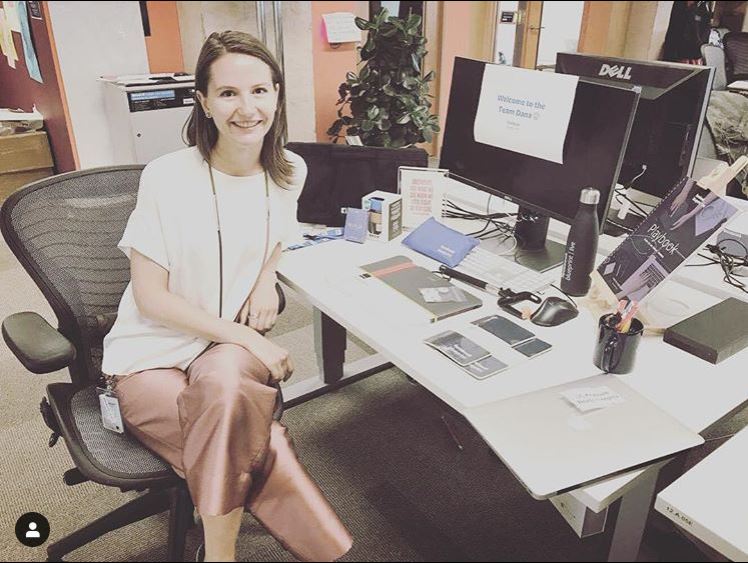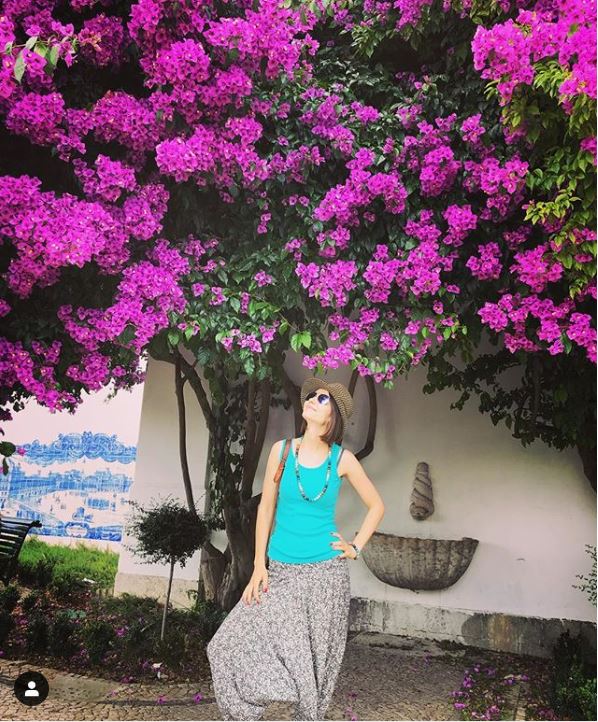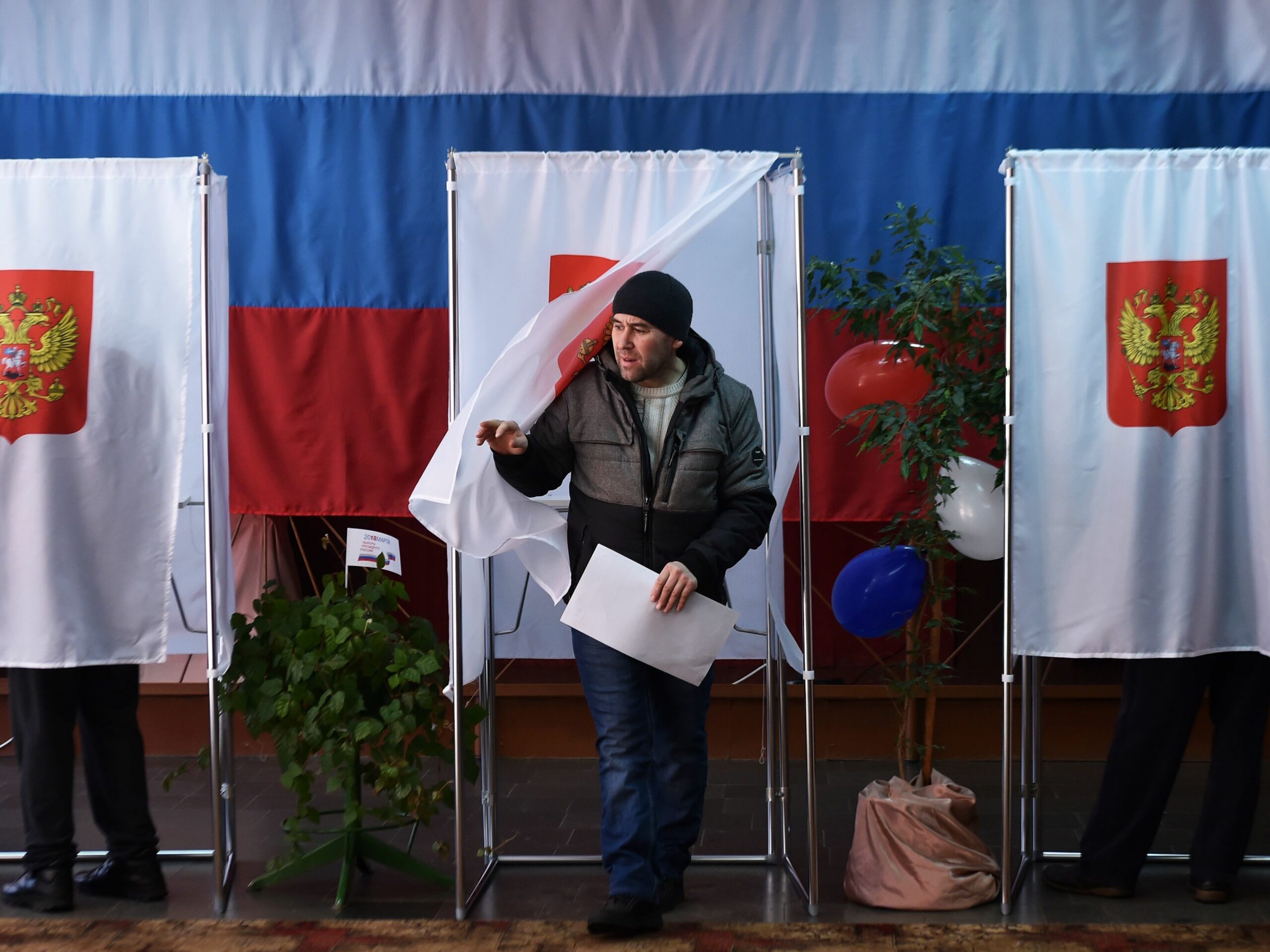Diaspora
Stories from diaspora / Dana Muntean: “Practice your elevator pitch. Craft a nice story about Moldova and deliver it to people”

Dana Muntean has a professional career and, generally, a life that can be compared to a kaleidoscope. For sure, it is not a classic journey. She tried so many things that one could wonder how this is even possible and she finally found her true vocation.
About trying everything
Dana was always an enthusiastic and restless girl. While doing her studies in International Economic Relations at the Academy of Economic Studies of Moldova, she was also trying to seize any opportunity. During her second year, Dana ventured to participate in a Russian language negotiation championship for young managers, although she wasn’t a manager at that time, and she didn’t have a native level of Russian. “I remember the moment when the recruiter asked me about what I was doing there and why they should even choose me. She said the competition director liked my ambition and the craving to think that I could do it. After the championship, I received 3 job offers at 3 different PR agencies from Moldova. I have accepted to work at Parc Communications,” recalls Dana.

Photo source: Instagram
In parallel, Dana was the editor of the faculty’s informative bulletin in English and founded a club of discussions on economic topics. Afterwards, our protagonist turned her attention to journalism while working at All Moldova and interviewing young entrepreneurs. When she moved to the USA for an exchange year at Bard College, Dana started to write for the BGIA’s online publication. Besides, she was involved in a lot of other activities such as acting, learning Italian, doing internships and volunteering. “I managed to obtain a bigger understanding of how an organization works by being involved in PR, marketing and sales.”
Dana even managed a team at the Diaspora Relations Bureau, moved to London for studies and was hired by the Next Jump company to work in sales. “After a while, I understood that I wasn’t passionate about the product I was selling & decided to move away from sales, and I decided to do marketing at Google and later Facebook. Finally, I realized that I actually miss & really like sales & negotiations. That’s why I am a Client Partner at Workplace by Facebook now. I do not just sell a software, but the future of work, by helping companies achieve the digital and cultural transformation they aspire to,” says Dana.

Photo source: Instagram
If there is a conclusion that needs to be drawn from this sinuous story, as Dana mentions, is that “you don’t have to worry about being different, experiencing, making crazy changes that no one understands. It won’t hinder your career. On the contrary, it can speed it up.” Dana thinks that every experience she had, helped her advance by opening new doors and awakening her curiosity.
About finding her passion
After a long process of searching, Dana finally found that thing that fascinated her the most: “My passion is to connect ideas with people, and sales is one of those areas where I can do it the best. This is where I want to be.” She managed to blend her passion and her job.
It wasn’t an easy process. “Sometimes, one runs away from what suits him the best. In my case, it’s sales.” Dana says that previously, she had a wrong perception about what sales really means. “Sales is about solving the clients’ challenges, advising and helping them to find the best solution. Even though, that is not necessarily the product you sell. Sales also mean negotiations, which I really like, the persuasion game that can be compared to a dance. In the end, something very beautiful can be accomplished. There is a lot of networking in sales as well.” Dana dreams about becoming one of the top negotiators in the world one day.

Photo source: Facebook
About MentorMe
MentorMe is the first Moldovan diaspora mentoring program. It was founded by Dana, along with an initiative group that was also working on another diaspora project that aimed to raise awareness in Moldova over exceptional academic achievement of students and Moldovan alumni abroad.
“MentorMe is a project that has a huge impact on hundreds of young people. It was founded in 2014 as a response to a problem that all people usually faced when they went to live abroad. Namely, the need of getting useful information and deciding about the future major, the right job, the application process for an internship, the way of getting a job promotion, etc. MentorMe has the role of connecting experts with beginners,” explains Dana.

Photo source: Instagram
The platform can easily connect two people from two different corners of the world. “We have expanded our activity. MentorMe is not just for the diaspora nowadays. We aim to connect all Moldovan and Romanian young people in the world.” The mentoring relationship implies that the mentee establishes a series of goals and tries to achieve them, with the help of a mentor, as Dana points out. Anyone can become a mentor or a mentee. To access this community, the interested person has to register and create a profile. The future mentors’ profiles are evaluated and passed through a selection process. “We are now developing a framework to facilitate the interaction between mentors and mentees, and to advise both parties about initiating and organizing conversations,” mentions Dana.
“MentorMe reflects my passion of connecting people, but also of building a team of people all over the world: Chișinău, London, Copenhagen, Berlin, Edinburgh, Bucharest. All these people want to contribute with something to the development of the country they came from and choose to do it in their free time.” At the moment, the project has released a beta version of the platform and gathers feedback from those who already use it. According to Dana, this is crucial for shaping a good product. The team working on the project, formed of 11 volunteers, also managed to find local partners. “We need them to help reaching more people. We work with Tekwill, the Educational Advising Center, and we are always open to new partnerships.”
When asked about the main challenges faced during the implementation of the project, Dana mentions that the most important challenge is to understand where they want to get. “The team is very diverse, each of us sees the project in a certain way. It’s a challenge to listen to each other, to establish a common vision.” Another challenge is the time management: “We are a team of volunteers who also have full-time jobs or studies. It is important to find time and to prioritize this project in order to make it grow.” Dana mentions that it is not easy to find local partners in order to build the MentorMe youth community, as well as to get funds and maintain the project’s sustainability.
About working at Google and Facebook
“It happens that we think something is impossible from the beginning and don’t even want to try. Companies like Facebook and Google look for the best specialists in the world, but also for young, flexible, ambitious, innovative, entrepreneurs, who are not afraid to develop their ideas and to initiate new projects.”

Photo source: Instagram
Dana says she was always thinking of working in such companies. However, she hadn’t managed to get accepted on her first try. She had been refused when applying for the first time for scholarship program at Warwick University or for a job at these world giants. The thing is, she never gave up. “I applied to Google and Facebook when I was a master student, but I wasn’t accepted. I didn’t even reach the interview stage. That happened because I wasn’t aware of their interview process and didn’t know how to better deal with it. Meanwhile, I was working in sales for a company in London, where I managed to have my own sales team. After some time, I happened to be approached by a Google recruiter through LinkedIn. I realized that I have friends who already worked there and asked them about the interviewing process. The inside information helped me to prepare better. I knew what to expect and what to focus on.”
Our protagonist advises people that want to apply for a job at such companies not to be afraid, to take advantage of every experience, even of failures, to find mentors that could help them reach their goal much faster, to explore opportunities and to create a valuable network.
“Even if you do not take the job at first, the experience of going through the selection process, reflecting on your strengths and weaknesses, is already a very good exercise.”
She reveals that her experience of initiating projects and being always active have helped her a lot to get the jobs she wanted. “It awakened my curiosity and demonstrated my values and capacities, as well as my interests in social work. If a person is in high school or at university, he or she should not be limited to studies. There must be extracurricular activities, volunteering, discussion club initiatives, project participation, elderly social assistance, summer schools, courses, reading books, networking, anything that could contribute to your growth. Go above and beyond!”

Photo source: Instagram
Of course, there is the other side of the coin. As Dana states, by having such an active lifestyle, it is easy to lose the balance and forget about doing sport, taking regular breaks, or rewarding oneself with some small things. She is still working on that. “It’s hard to disconnect from what you do and love. I could work nonstop, including the weekends. That is why I put some rules in place, as I need to make sure that my personal life is not ignored.”
About Moldova
Dana is proud that she comes from Moldova. Thus, there are some things that Moldovans need to be aware of, according to her: “There is no clear picture about Moldova in this world. People don’t know about us. In most cases, I am the first Moldovan they meet, and they are curious to find out more. We lack an interesting story about Moldova that we could tell others.” It’s a pity, as Dana says, that some Moldovans even hide their origins. “I remember I was at a party in Washington DC and I was introduced to another Moldovan who was not very excited that his nationality was revealed. I think it is important to remember our origins. This is what makes us special. Imagine that we have a white canvas that we can paint as we wish and create our image as a country.”

Photo source: Instagram
Dana goes to Moldova at least 3 times a year.
“Next time I go to Moldova is for elections on February 24th. My vote matters 50X more at home.”
Every time she misses home, she listens to her favourite Moldovan songs, reads a book in Romanian, tries to reconnect with friends from home, pays a visit to the beloved ones or meets them somewhere else.
Dana thinks that people in diaspora can do more than just complain about the situation at home. “The problems in Moldova are not someone else’s. They are ours too. So, let’s get involved. If there is no desire to invest time and effort for a cause, people from diaspora could find a newspaper, an NGO, an initiative group and support them financially. Money, time and ideas are major contributions. Just do it!”
Society
“They are not needy, but they need help”. How Moldovan volunteers try to create a safe environment for the Ukrainian refugees

At the Government’s ground floor, the phones ring constantly, the laptop screens never reach standby. In one corner of the room there is a logistics planning meeting, someone has a call on Zoom with partners and donors, someone else finally managed to take a cookie and make some coffee. Everyone is exhausted and have sleepy red eyes, but the volunteers still have a lot of energy and dedication to help in creating a safe place for the Ukrainian refugees.
“It’s like a continuous bustle just so you won’t read the news. You get home sometimes and you don’t have time for news, and that somehow helps. It’s a kind of solidarity and mutual support,” says Vlada Ciobanu, volunteer responsible for communication and fundraising.
The volunteers group was formed from the very first day of war. A Facebook page was created, where all types of messages immediately started to flow: “I offer accommodation”, “I want to help”, “I want to get involved”, “Where can I bring the products?”, “I have a car and I can go to the customs”. Soon, the authorities also started asking for volunteers’ support. Now they all work together, coordinate activities and try to find solutions to the most difficult problems.
Is accommodation needed for 10, 200 or 800 people? Do you need transportation to the customs? Does anyone want to deliver 3 tons of apples and does not know where? Do you need medicine or mobile toilets? All these questions require prompt answers and actions. Blankets, sheets, diapers, hygiene products, food, clothes – people bring everything, and someone needs to quickly find ways of delivering them to those who need them.
Sometimes this collaboration is difficult, involves a lot of bureaucracy, and it can be difficult to get answers on time. “Republic of Moldova has never faced such a large influx of refugees and, probably because nobody thought this could happen, a mechanism of this kind of crisis has not been developed. Due to the absence of such a mechanism that the state should have created, we, the volunteers, intervened and tried to help in a practical way for the spontaneous and on the sport solutions of the problems,” mentions Ecaterina Luțișina, volunteer responsible for the refugees’ accommodation.
Ana Maria Popa, one of the founders of the group “Help Ukrainians in Moldova/SOS Українці Молдовa” says that the toughest thing is to find time and have a clear mind in managing different procedures, although things still happen somehow naturally. Everyone is ready to intervene and help, to take on more responsibilities and to act immediately when needed. The biggest challenges arise when it is necessary to accommodate large families, people with special needs, for which alternative solutions must be identified.
Goods and donations
The volunteers try to cope with the high flow of requests for both accommodation and products of all kinds. “It came to me as a shock and a panic when I found out that both mothers who are now in Ukraine, as well as those who found refuge in our country are losing their milk because of stress. We are trying to fill an enormous need for milk powder, for which the demand is high and the stocks are decreasing”, says Steliana, the volunteer responsible for the distribution of goods from the donation centers.
Several centers have been set up to collect donations in all regions of Chisinau, and volunteers are redirecting the goods to where the refugees are. A system for processing and monitoring donations has already been established, while the volunteer drivers take over the order only according to a unique code.
Volunteers from the collection centers also do the inventory – the donated goods and the distributed goods. The rest is transported to Vatra deposit, from where it is distributed to the placement centers where more than 50 refugees are housed.
When they want to donate goods, but they don’t know what would be needed, people are urged to put themselves in the position of refugees and ask themselves what would they need most if they wake up overnight and have to hurriedly pack their bags and run away. Steliana wants to emphasise that “these people are not needy, but these people need help. They did not choose to end up in this situation.”
Furthermore, the volunteer Cristina Sîrbu seeks to identify producers and negotiate prices for products needed by refugees, thus mediating the procurement process for NGOs with which she collaborates, such as Caritas, World Children’s Fund, Polish Solidarity Fund, Lifting hands, Peace Corps and others.
One of the challenges she is facing now is the identifying a mattress manufacturer in the West, because the Moldovan mattress manufacturer that has been helping so far no longer has polyurethane, a raw material usually imported from Russia and Ukraine.
Cristina also needs to find solutions for the needs of the volunteer groups – phones, laptops, gsm connection and internet for a good carrying out of activities.
Hate messages
The most difficult thing for the communication team is to manage the hate messages on the social networks, which started to appear more often. “Even if there is some sort of dissatisfaction from the Ukrainian refugees and those who offer help, we live now in a very diverse society, there are different kind of people, and we act very differently under stress,” said Vlada Ciobanu.
Translation by Cătălina Bîrsanu
Featured
FC Sheriff Tiraspol victory: can national pride go hand in hand with political separatism?

A new football club has earned a leading place in the UEFA Champions League groups and starred in the headlines of worldwide football news yesterday. The Football Club Sheriff Tiraspol claimed a win with the score 2-1 against Real Madrid on the Santiago Bernabeu Stadium in Madrid. That made Sheriff Tiraspol the leader in Group D of the Champions League, including the football club in the groups of the most important European interclub competition for the first time ever.
International media outlets called it a miracle, a shock and a historic event, while strongly emphasizing the origin of the team and the existing political conflict between the two banks of the Dniester. “Football club from a pro-Russian separatist enclave in Moldova pulls off one of the greatest upsets in Champions League history,” claimed the news portals. “Sheriff crushed Real!” they said.
Moldovans made a big fuss out of it on social media, splitting into two groups: those who praised the team and the Republic of Moldova for making history and those who declared that the football club and their merits belong to Transnistria – a problematic breakaway region that claims to be a separate country.
Both groups are right and not right at the same time, as there is a bunch of ethical, political, social and practical matters that need to be considered.
Is it Moldova?
First of all, every Moldovan either from the right or left bank of Dniester (Transnistria) is free to identify himself with this achievement or not to do so, said Vitalie Spranceana, a sociologist, blogger, journalist and urban activist. According to him, boycotting the football club for being a separatist team is wrong.
At the same time, “it’s an illusion to think that territory matters when it comes to football clubs,” Spranceana claimed. “Big teams, the ones included in the Champions League, have long lost their connection both with the countries in which they operate, and with the cities in which they appeared and to which they linked their history. […] In the age of globalized commercial football, teams, including the so-called local ones, are nothing more than global traveling commercial circuses, incidentally linked to cities, but more closely linked to all sorts of dirty, semi-dirty and cleaner cash flows.”
What is more important in this case is the consistency, not so much of citizens, as of politicians from the government who have “no right to celebrate the success of separatism,” as they represent “the national interests, not the personal or collective pleasures of certain segments of the population,” believes the political expert Dionis Cenusa. The victory of FC Sheriff encourages Transnistrian separatism, which receives validation now, he also stated.
“I don’t know how it happens that the “proud Moldovans who chose democracy”, in their enthusiasm for Sheriff Tiraspol’s victory over Real Madrid, forget the need for total and unconditional withdrawal of Russian troops from Transnistria!” declared the journalist Vitalie Ciobanu.
Nowadays, FC Sheriff Tiraspol has no other choice than to represent Moldova internationally. For many years, the team used the Moldovan Football Federation in order to be able to participate in championships, including international ones. That is because the region remains unrecognised by the international community. However, the club’s victory is presented as that of Transnistria within the region, without any reference to the Republic of Moldova, its separatist character being applied in this case especially.
Is it a victory?
In fact, FC Sheriff Tiraspol joining the Champions League is a huge image breakthrough for the Transnistrian region, as the journalist Madalin Necsutu claimed. It is the success of the Tiraspol Club oligarchic patrons. From the practical point of view, FC Sheriff Tiraspol is a sports entity that serves its own interests and the interests of its owners, being dependent on the money invested by Tiraspol (but not only) oligarchs.
Here comes the real dilemma: the Transnistrian team, which is generously funded by money received from corruption schemes and money laundering, is waging an unequal fight with the rest of the Moldovan football clubs, the journalist also declared. The Tiraspol team is about to raise 15.6 million euro for reaching the Champions League groups and the amounts increase depending on their future performance. According to Necsutu, these money will go directly on the account of the club, not to the Moldovan Football Federation, creating an even bigger gab between FC Sheriff and other football clubs from Moldova who have much more modest financial possibilities.
“I do not see anything useful for Moldovan football, not a single Moldovan player is part of FC Sheriff Tiraspol. I do not see anything beneficial for the Moldovan Football Federation or any national team.”
Is it only about football?
FC Sheriff Tiraspol, with a total estimated value of 12.8 million euros, is controlled by Victor Gusan and Ilya Kazmala, being part of Sheriff Holding – a company that controls the trade of wholesale, retail food, fuels and medicine by having monopolies on these markets in Transnistria. The holding carries out car trading activities, but also operates in the field of construction and real estate. Gusan’s people also hold all of the main leadership offices in the breakaway region, from Parliament to the Prime Minister’s seat or the Presidency.
The football club is supported by a holding alleged of smuggling, corruption, money laundering and organised crime. Moldovan media outlets published investigations about the signals regarding the Sheriff’s holding involvement in the vote mobilization and remuneration of citizens on the left bank of the Dniester who participated in the snap parliamentary elections this summer and who were eager to vote for the pro-Russian socialist-communist bloc.
Considering the above, there is a great probability that the Republic of Moldova will still be represented by a football club that is not identified as being Moldovan, being funded from obscure money, growing in power and promoting the Transnistrian conflict in the future as well.
Photo: unknown
Elections
Russia’s legislative elections: Why are there 27 polling stations in Transnistria?

Legislative elections are currently being held in Russia between September 17-19, as 450 new members in the State Duma need to be elected.
The Central Election Commission (CEC) of the Russian Federation decided to open a record number of polling stations in the Transnistrian region – 27 polling stations, in addition to only 3 polling station opened on the right bank of the Dniester in such big cities as Chisinau, Comrat and Balti.
That is the largest number of polling stations opened by the Russian CEC in a foreign country, and five polling stations more than in the 2016 elections. Two of the polling stations were established in Tiraspol, being open from Friday to Sunday. The rest of the Russian polling stations on the Transnistrian territory are opened on Sunday only. The most astonishing fact is that no state other than Russia has ever opened polling stations in the separatist region of the Republic of Moldova. Actually, no polling stations are being opened on the Transnistrian territory when it comes to national elections of the Republic of Moldova either.
Therefore, one could say that the stakes are high when it comes to Transnistrian voters, especially since, most likely, the hopes of Russian authorities are not necessarily based on a large turnout and their real support, rather on the real possibility of electoral fraud on a territory that is not controlled by the constitutional authorities in Chisinau.
Before the presidential elections in 2018, Russian authorities announced that there are 220 thousand Russian citizens living in the Transnistrian region. That time, 24 polling stations were opened in the separatist area. Despite the fact that the Tiraspol Electoral Commission announced that, in the last year and a half alone, the voter turnout has officially fallen in the region by more than 7 700 people, the Russian CEC still decided to establish a record number of polling stations this year, which strengthened the argument about the possibility of election fraud.
Both Tiraspol’s administration and the regional media campaigned for the ruling political party United Russia and called for a high turnout at polling stations. Transnistria’s leader, Vadim Krasnoselski, urged the people on the left bank of the Dniester to come to the polls “because despite all the difficulties, Russia does not forget Transnistria and helps it as much as possible.”
It seems that the campaigning, along with the Russian sponsorship in the region, show great results during every election ballot, as Russian citizens voting in Russian elections in Transnistria are a more active electorate than Moldovan citizens residing in Transnistria and voting in the Moldovan elections at the polling stations arranged on the other bank of the Dniester, especially for them. In the previous Russia’s legislative elections, 56 thousand people voted in Transnistria, while just under 29 thousand inhabitants of the Transnistrian region voted in the recent Moldova’s parliamentary elections.
Before every election ballot held in the Russian Federation, Moldovan authorities make statements, suggesting the Russian side to abstain from opening polling stations in Transnistria, whereas Russian authorities ignore them every time.
This year, the Ministry of Foreign Affairs and European Integration of the Republic of Moldova also sent a note of protest against opening the polling stations in Transnistria. “The Ministry of Foreign Affairs and European Integration regrets that, despite the position consistently expressed by the Moldovan authorities, the Russian side acted in a manner that does not correspond to the principle of sovereignty and territorial integrity of the Republic of Moldova and the bilateral legal framework.”
The Ministry representatives noted that Russian authorities were informed of the lack of impediments to open polling stations in localities under the control of Moldova’s constitutional authorities and requested the Russian side to refrain from opening the 27 polling stations in the localities of the breakaway region, given the impossibility of ensuring the necessary security conditions for the current elections.
Moscow’s Central Election Commission also opened nine polling stations in Abkhazia and ten in South Ossetia – two disputed territories that were internationally recognised by Russia and a few more countries, while considered under military occupation, according to the Georgian Government. These lands, that are under the exclusive control of Russia, offer good opportunities to ‘correct’ any uncomfortable results obtained in the country, where the ruling political party no longer enjoys as much support as it wants to appear.
Photo: wjct.org

























